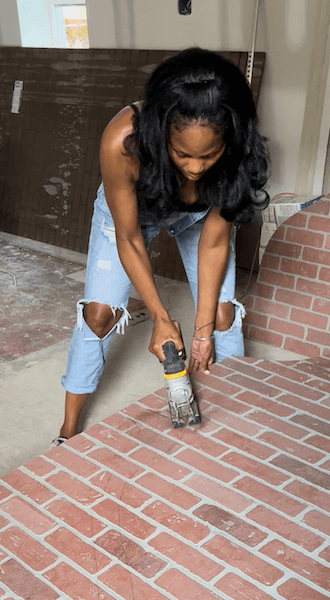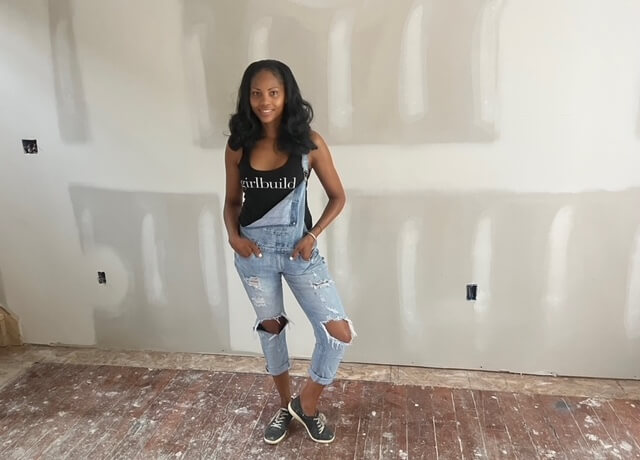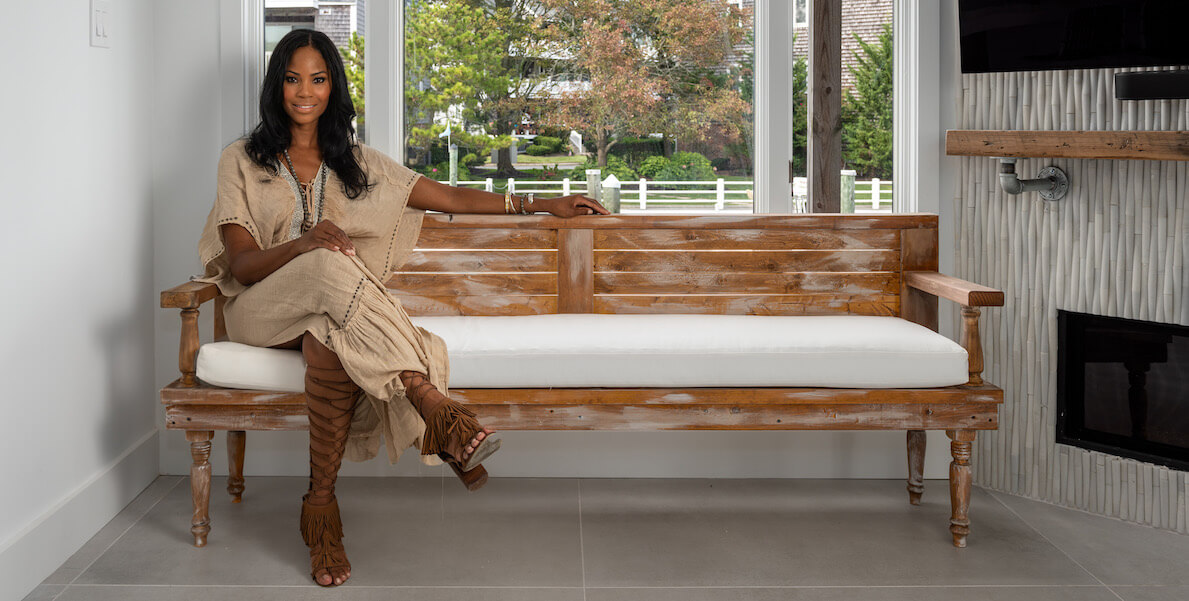When Monica Miraglilo purchased her first house in East Falls in the 1990s, she knew it would take a lot of work to transform it into a home.
The place needed to be completely gutted — walls demolished, cabinets hung, tile laid. But Miraglilo had a dream for what it could be. She envisioned a large kitchen for entertaining friends and family from out of town. And, like so many Philadelphians, she fell in love with the old house’s original character: stone walls, hardwood floors … potential.
“I knew that even though it was a huge undertaking that I would eventually make the house a home,” she says. “I had a daughter that was three going on four and I really wanted to give her a home that we could call her own.”
Her family and friends weren’t as optimistic. Miraglilo was a single mother with a background in modeling. She’d never done any construction or design work. How would she manage such a big project?
Women have long faced barriers to entering and doing construction work. In 2020, only 10.9 percent of workers in the industry were women, per Bureau of Labor Statistics data. A 2021 report from the Institute for Women’s Policy Research found that 39 percent of women and non-binary people consider leaving construction or other trades because they felt they weren’t being taken seriously.
“Starting out can be intimidating, but to see other women dominating in all facets of rehabbing is empowering,” says Matasa Williams. “It gives me confidence and lets me know I’m not alone.”
But Miraglilo persisted. “It was definitely a money pit,” she says, “But no one was going to tell me that I couldn’t do it.” And, she did it: Fixed the house (with some help from strangers she met in Home Depot), and turned it into a showroom that eventually launched a design-rehab business.
Three decades later, she’s helping other women break into the home renovation and design businesses. Her company, Girlbuild, hosts virtual workshops that teach women how to renovate, design, finance, and manage their own home rehab projects. The business’s first series of lessons launched last month. More recently, Girlbuild has partnered with the Aequo Fund to help members finance first renovation projects.
An entrepreneur is born
Before Miraglilo became Philly’s version of the Property Brothers, she worked as a model for QVC. In the early aughts, she left that job to her own interior design business. In 2005, she married her husband, Mike, who’d go on to become a general contractor. In 2006, she opened Fill a Pillow, a home goods shop in Haverford, which featured her own designs.
She ran the shop for a few years — but couldn’t resist the lure of the fixer-upper. A few years later, she took a design job for a construction company. She liked the design part, but preferred to be hands-on. She followed co-workers to sites, and worked beside them. “I started laying tile. I started knocking walls down,” she says. Eventually, she took the OSHA certification she needed to become a licensed contractor in Philadelphia.
In 2017, she and Mike teamed up to launch Miraglilo Properties, a real estate development company that purchases and renovates properties from rowhomes to apartments to multi-use commercial spaces. Mike focuses on the building aspects, and Monica leads the interior design efforts — but both can be seen wielding power tools and sledgehammers on Monica’s Instagram.
After a few years of working in rehab, Miraglilo got fed up with construction attire. Clothes made for the trade were boxy and unattractive, while attractive clothes got ruined on job sites. So, she began designing and selling hard-wearing — and cute — sweatshirts, t-shirts, hard hats, and jumpsuits for women working construction. (Didn’t hurt that she herself, who still dabbles in modeling, modeled the pieces.)
She launched her Girlbuild line in October of 2020. Today, the pieces range from branded tees and cropped sweatshirts to distressed denim overalls, camo jumpsuits and neon hazard pants that are as functional as they are fashionable. They even sell a white hard hat with a Chanel-style logo with the initials GB, with a hammer in the center.
“Women need to feel confident about what they’re wearing,” Miraglilo says. “I’m going to give them something that’s cool, that looks good and that they can still feel competent in.”
As her clothing company built a following, so did her Instagram account. The comments and DMs from women who wanted both construction site-worthy clothes — and advice — seemed nonstop.
“One day when I was just sitting around and I realized that you know what? No one else is going to help us if we don’t help ourselves,” she says.

Girl, build
So Miraglilo pivoted. Again. This time, to educational content production. Last month, nearly two years after starting Girlbuild’s clothing line, she launched the company’s first set of 14 virtual workshops — like MasterClasses, for purchasing and flipping a home.
The sessions cover every step of the rehab process, from how to work with a realtor to find a home worth buying to how to demolish walls and install cabinets and flooring. Interior design advice too. It’s everything Miraglilo wished someone had taught her years ago in East Falls.
“I received that opportunity to create and to learn the business step-by-step. I wanted to give back and show other women the stepping stones,” she says.
Speakers for the first series include Ben Goff with OSHA, Philadelphia; Rica Suhanec, an architectural account executive with Sherwin Williams; and realtor Maria Quattrone, from RE/MAX. She plans to keep adding videos that delve into more advanced construction topics as well as marketing and other business skills.
A Girlbuild subscription costs $147 and includes access to the workshops and quarterly one-on-one Zooms with Miraglilo. She envisions the sessions will help both homeowners looking to make a few improvements and women looking to a career in construction and real estate development.
For the latter group, Girlbuild has partnered with the Aequo Fund, a $6.2 million and growing fund designed to support early career developers, to help members finance their first renovation project.
Founded by Ernst Valery (also a lecturer for the Girlbuild workshops) in 2021, the Aequo fund seeks to finance projects by local, undercapitalized developers, including women and people of color, with a bent toward supporting those who are working on affordable housing projects. The fund is currently active in cities including Philadelphia, Baltimore, Buffalo, Portland and Richmond. The fund’s name translates to “make equal” in Latin.
Miraglilo met Valery through a realtor and has worked with him on a number of Philly-based projects. The fund will upfront the costs of purchasing a Girlbuild workshop member’s first home and supporting the costs of construction in any area where the fund is active for renovation, in exchange for a portion of the project’s profits upon the sale of the home. They’re currently in the process of developing the full details of how the program will function.
“They basically will help fund your first flip,” Miraglilo says.
The workshops are less than a month old — too early for Miraglilo to feel comfortable sharing membership or revenue figures. She plans to start advertising the workshops through social media and partnerships with companies like Sherwin Williams, where she’s launched a collaborative paint palette.
Matasa Williams is one of Girlbuild’s first members. The Brooklyn-based TV producer found the company last year while scrolling through Instagram for posts mentioning Philly home renovations. Williams, like so many of us, has an abiding interest in interior design, especially fixer-uppers.
“I love the process of seeing what a distressed home could potentially be if you put in the work,” she says.
Williams purchased a home in St. Louis in 2019 with the intention of working with local builders to renovate and flip it. But her lack of experience budgeting for the construction costs and vetting contractors caused the project to drag on for two years.
But, like Miraglilo once was, Williams is determined. She’s already begun lessons and received one-on-one rehab coaching from Miraglilo. She’ll need it: She recently purchased three fixer-uppers in Philly. She credits Girlbuild’s with giving her the tools to begin the work.

“I’ve learned how to properly estimate costs and add padding for unexpected expenses; I’ve learned to properly vet contractors; and I’ve learned a few hands-on skills that help move the process along and save money,” Williams says. “Starting out can be intimidating, but to see other women dominating in all facets of rehabbing is empowering. It gives me confidence and lets me know I’m not alone.”
Miraglilo’s biggest hope for Girlbuild is that it will be an empowerment initiative for women interested in the construction industry. Though the family sold their East Falls home earlier this July, Miraglilo still has fond memories of the work and the parts of herself she literally put into those walls.
She thinks of her own daughter, now 27, who got to watch her mother renovate their first home and imagines a future where little girls play with doll houses — and dream about building their own homes.
“I want [my daughter] to see me as a strong, independent, confident woman,” she says. “ I want her to be empowered and just know that she can do anything and it doesn’t matter if she’s a woman or not. She is unstoppable, invincible and can conquer all things that she puts her mind to.”
![]() MORE DEVELOPMENT FOR GOOD IN PHILLY
MORE DEVELOPMENT FOR GOOD IN PHILLY



